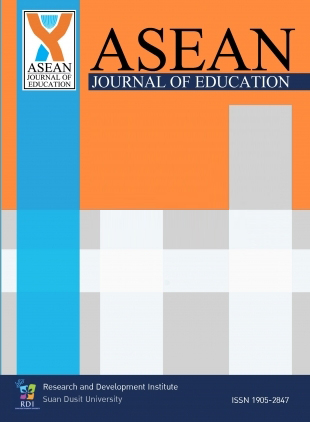A Learning Management Model to Enhance the Thai Communication Skills of Undergraduate Students
Keywords:
Learning management model, Thai communication skills, Undergraduate studentsAbstract
The research objective was to develop a learning management model to enhance the Thai communication skills of undergraduate students. The research instruments were 1) questionnaire of current and desirable conditions towards learning management for enhancing Thai language communication skills of undergraduate students. 2) Assessment form 3) Pre-study and post-study test in Thai communication for undergraduate students. The sample used for analysis from cluster sampling. The sample group were 40 1st - 2nd year level who were studying Thai language courses in the second semester of the academic year 2019 in Suan Dusit UniversityIt using cluster random sampling. The results revealed that 1.) A model of learning management to enhance Thai communication skills consists of 5 components: Principles, Objectives, Content, Learning management process, and Assessment. The results of the assessment and certification of a learning management model to enhance the Thai communication skills of undergraduate students was 4.84 at the most appropriate level. And 2) Undergraduate students who received this kind of learning model improved Thai language communication skills.
References
Arunwipas, T. (2009). Effect of feedback from different forms and methods on English writing skills for grade 6 students of Wat Nang Nong Kindergarten School.
Bhat, S., et al,. (2018). Leveraging E-learning through google classroom : a usability study. Journal of Engineering Education Transformations, 31(3), 129-135.
Brookhart, S. M. (2008). How to give effective feedback to your students. USA: ASCD.
Chaychengwit, A. and Wiriyanon, T. (2017). Development of a reverse classroom teaching model using cooperative learning via social networks. Journal of Industrial Technology, Ubon Ratchathani Rajabhat University, 7(1), 163-178.
Churiporn, C. (2019) The development of Thai language instructional model for enhancing reading literacy and communication for students of primary school grade 6. Journal of MCU Nakhondhat, 6(6), 2712-2726.
Faculty of Chulalongkornrajavidyalaya University. (2008). Language and Communication. Bangkok Chulalongkorn rajavidyalaya University.
Hirumi, A., Appelman, B., Rieber, L., and Eck, R.V.,. (2010). Preparing Instructional Designers for Game-Based Learning : Part 2. TechTrends, 54(4), 19-27.
Isman, A. (2011). Instructional design in education : new model. Tojet : The Turkish Online Journal of Educational Technology, 10(1), 136-142.
Jitwiriys, K. (2015). Development of an instructional design model for blended coaching and action learning for supervisors to enhance secondary school teachers’ict utilization. (Doctoral dissertation, Chulalongkorn University). Chulalongkorn University Intellectual Repository (CUIR). https://cuir.car.chula.ac.th/bitstre am/123456789/51152/1/5384204227.pdf
Karo, D. (2018). Application of Google for Education to mentor students with teachers. Journal of Academic Resources Prince of Songkla University, 29(2), 219-227.
Khamanee, T. (2011). Pedagogy: Knowledge for effective learning process. Bangkok: Chulalongkorn University Press.
Klibngern, W. (2018). Development of learning management model, teaching methodology in Thai language through the research-based learning for students in Thai language, faculty of education, Uttaradit Rajabhat university. Graduate School Journal, 11(3), 1-10.
Laryea, S. (2013). Feedback provision and use in teaching and learning : a case study. Education+Training, 55(7), 665-680.
Lt. Col. Poolputtha. (2017). Model of feedback to promote classroom research competencies of teacher training students, Rajabhat Mahasarakham University. Academic Journal and Social Science Research, 13(37), 61-74.
Long, T., et al. (2017). Use of the flipped classroom instructional model in higher education : instructors’ perspectives, Journal of Computing in Higher Education, 29, 179-200.
Luksanasiri, C. (2013). Thai language for communication. Nakhon Pathom: Silpakorn University
Petcharat, J. and Thongbai, A. (2012). Thai language for communication. Bangkok: O.S. Printing House.Press.
Prastiyo, W., et al,. (2018). Development of Youtube integrated Google Classroom based e-learning media for the light-weight vehicle engineering vocational high school. Journal Pendidikan Vokasi, 8(1), 53-66.
Polvik., S. (2012). Development of a blended teaching and learning model. Vocational Certificate Program. College of Agriculture and Technology Nakhon Si Thammarat.
Pounder, E. (2009). A framework for effective feedback for non-native learners of English writing. Education, Business and Society, 2(3), 174-180.
Puthyrom, T., Suwanna, S., and Suriyoung, L.,. (2017). A game-based learning approach to improve students' learning achievement in data flow diagram course. Phranakhon Rajabhat Research Journal (Humanities and Social Sciences), 12(2), 1-9.
Sathornsumritphon, S. (2011). Thai Language 1. Bangkok : Triple Education,
Setthaphong, T. (2016). The development of teaching and learning models based on the concept of reading from the prototype and the Meaningful mapping strategies to promote analytical reading abilities of higher education students. Doctor of Education Thesis Program and Teaching Areas Chulalongkorn University
Singhaad, S. and et al. (2018). The achievement and satisfaction of nursing students towards teaching and learning through Google Classroom in the course of nursing information technology. Journal of Humanities and Social Sciences, 9(2), 124-137.
Somprayoon, W. (2010). Teaching Thai language. Bangkok: Dok Ya Academic.
So, L., and Lee, C. H. (2013). A case study on the effects of an L2 writing instructional model for blend learning in higher education. TOJET : the Turkish online journal of educational technology, 12(4), 1-10.
Sung. (2013). A collaborative game-based learning approach to improving students' learning performance in science courses. Computers & Education, 63, 43-51.
Tannirat, T. (2017). Development of an instructional model by integrating information problem solving, scaffolding and z to a approach for creative product development. (Doctoral dissertation, Chulalongkorn University). Chulalongkorn University Intellectual Repository (CUIR). https://cuir.car.chula.ac.th/bitstream/12345 6789/59708/1/5884212727.pdf
Wibunyasarin, W. (2019). Listening for the sage. In Supasiri Bunprawet et al. (Ed.), Teaching document for course 1500119 Thai language to develop a well-rounded person. Bangkok: Graphic Site Media and Publishing Service Center.
Downloads
Published
How to Cite
Issue
Section
License

This work is licensed under a Creative Commons Attribution-NonCommercial-NoDerivatives 4.0 International License.
1 All articles will undergo a formal peer-review. A panel of experts from within or without the university will examine the article; approval from a minimum of two experts is required for publication. Revisions posed by the experts must be completed by the research prior to publication.
2 Once published in the ASEAN Journal of Education, the article becomes intellectual property of Suan Dusit University. Duplication, in full or part, requires permission from Suan Dusit University.
3 Excluding errors incurred during printing, author(s) are responsible for the content of their articles.






